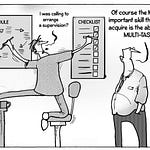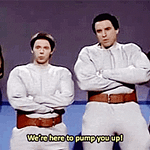Here’s a text version of the podcast is you’d prefer to read instead of listen: “
So, what separates a high-performing project manager from an average one? What should hiring managers really be looking for in an interview?
A truly great project manager has the perfect balance of technical expertise, leadership ability, strategic thinking, and adaptability. If they’re missing any of these elements, they may struggle when faced with real-world project challenges.
There are four key skills that should be at the top of your checklist when interviewing a project manager:
1. Communication & Stakeholder Management.
If a project manager can’t communicate effectively, the entire project suffers. They don’t just need to be good at writing emails and giving presentations—they need to be able to:
Translate complex information for different audiences—A PM has to talk to executives, engineers, designers, vendors, and clients, all of whom have different levels of technical understanding. If they can’t explain things clearly and concisely, misunderstandings will cause delays, scope creep, and frustration.
Align teams with different priorities—A finance director cares about budget, a developer cares about code quality, and a marketing team cares about customer impact. A project manager’s job is to synthesize all of these perspectives and make sure everyone is on the same page.
They should be able to handle difficult conversations professionally: Whether it’s pushing back on unrealistic deadlines, resolving conflicts between team members, or delivering bad news to a client, a strong PM knows how to communicate tough messages without burning bridges.
If a candidate struggles to articulate how they’ve handled difficult stakeholders in the past, they might not be ready for high-pressure communication challenges.
Number 2: Project managers aren’t just task managers—they’re leaders. If they’re waiting around for executives to make every decision, they’re not actually managing the project—they’re just relaying messages.
A high-performing PM must be able to motivate and empower teams—Projects are stressful, deadlines slip, morale fluctuates, etcetera. A great PM knows how to keep a team focused, energized, and productive, even when things get tough. They create an environment where people want to contribute, feel valued, and are encouraged to take ownership of their work.
No project goes exactly as planned. A strong PM doesn’t freeze when things go wrong. Instead, they: Weigh the trade-offs between scope, time, and cost, consult the right people for input but don’t delay making necessary calls, and are willing to own their decisions rather than passing blame.
He or she should set the tone for accountability—Great project managers don’t micromanage. Instead, they create a culture of accountability where teams know what’s expected and take initiative.
With that said, If a candidate can’t give a clear example of a tough decision they made and the impact it had, that’s a sign they may not be comfortable in a leadership role.
Another key skill is Risk Management slash Problem-Solving.
Here’s the thing—every project will run into issues, roadblocks, and unexpected surprises. What separates a great project manager from a mediocre one is how well they anticipate problems and react when things go wrong.
A strong PM knows how to:
Spot potential risks before they become major issues—This means thinking ahead and asking the right questions, like What could delay this project, Are we relying too much on one vendor or one resource, and/or Do we have backup plans in case something goes wrong?
The best PMs don’t just hope everything goes smoothly. They plan for setbacks so that when things go off course, there’s already a strategy in place.
Solve problems without panic—In high-pressure situations, weak PMs scramble, blame others, or wait for leadership to step in. Great PMs assess the situation, weigh the options, and move forward confidently.
An interview red flag is if the candidate can’t provide a clear example of a time they identified and mitigated a risk, they may not be proactive enough to handle real-world challenges.
A common hiring mistake is looking for a project manager who is only experienced in one methodology. The reality? No single framework works for every project.
A high-performing PM:
Understands multiple methodologies— from Scrum, Kanban, Waterfall, Hybrid and they know the strengths and weaknesses of each and can explain when to use them.
He or she can adapt to a company’s existing processes—Every organization has different ways of working. The best PM's don’t demand “my way or the highway”—they assess what’s already working and integrate their expertise accordingly.
So if a candidate insists that only one methodology is effective, they may struggle in environments where flexibility is required.
How do you ask the right questions? What should you listen for? And what are the red flags that should make you think twice before making a hire?
You need to go beyond generic behavioral questions and ask things that reveal how they think, solve problems, and lead teams.
Here are five essential interview questions you should be asking and why you should ask them. Also, if you're a candidate looking for a PM role, you should be preparing answers to these questions.
1. "Tell me about a time you had to handle a project that was going off track—what did you do?"
This tests problem-solving ability, adaptability, and leadership under pressure. Every project encounters issues—budget cuts, shifting priorities, missed deadlines. A strong PM should be able to assess the situation, adjust course, and get the project back on track.
If they say, “The team just wasn’t performing” or “Stakeholders kept changing things”, that’s a sign they don’t take ownership. If they can’t outline how they diagnosed the issue, communicated with stakeholders, and course-corrected, they may not be proactive problem solvers.
A high-performing PM will walk you through: What went wrong (e.g., the vendor missed a deadline), how they assessed the risk, what actions they took, and what they learned from it.
2. "How do you handle difficult stakeholders?"
You want to ask this because no project exists in a vacuum—PMs work with executives, clients, engineers, finance teams, and more. Not all stakeholders are easy to work with. A strong PM navigates conflicts professionally, aligns different priorities, and manages expectations. If he says, “I just do what the stakeholders want”, they lack the ability to push back when needed. If they struggle to recall a time they had to navigate stakeholder conflict, they might not have much experience managing complex relationships.
A great answer will describe a real situation where stakeholders had conflicting needs and they’ll explain how they communicated with each party, found a compromise, and made sure everyone stayed aligned without derailing the project.
3. "Give an example of a project where you had to balance scope, time, and cost—how did you manage it."
Every project is a balancing act between scope, timeline, and budget. The best PMs know when to negotiate trade-offs, when to escalate issues, and when to push back on unrealistic expectations.
If they insist or suggest that “projects should never change scope,” they might not be adaptable. Or if they say, “I just did whatever my manager told me”, they may not be comfortable taking ownership.
A great Project Manager should describe a scenario where they had to make trade-offs: They may say something like, “The client wanted to add a new feature late in the project. The timeline wouldn’t allow for it without sacrificing quality, so I worked with the team to present two options—either extend the deadline or adjust another feature to accommodate the change. The client chose to prioritize speed, so we delivered a streamlined version of the feature.”
That’s strategic thinking. That’s what you want in a PM.
4. "What’s your approach to team motivation and conflict resolution?"
This helps you suss out their leadership style—do they inspire teams, or just enforce deadlines? And it also shows if they resolve conflicts constructively rather than letting tension build.
Red Flags to Watch For: Too much focus on control: If they say, “I make sure everyone is following the plan,” that’s micromanagement, not leadership. Or If they can’t explain how they motivate people, they may not be good at fostering collaboration.
A great answer should explain how they motivate teams by creating a culture of ownership or when conflicts arise,how they first listen to both sides and then align everyone on a shared goal to find common ground.
5. "Which project management methodology do you prefer and why?"
What this question reveals is if they are stuck in one way of thinking, or do they adapt to different project needs. See if they can explain why they use certain methodologies instead of just listing them.
If they say, “I only do Agile”, that’s a red flag. Or If they say something like, “Because that’s what my last company used,” they might lack deep understanding of methodologies.
Here’s an example of a great answer: “It depends on the project. If we’re working in a fast-moving software environment, I prefer Scrum for its iterative delivery. If we have a fixed-scope construction project, Waterfall makes more sense. For complex corporate initiatives, I like Hybrid approaches that allow for some flexibility.”
That’s the kind of PM who will adapt to real-world challenges.
Hiring a project manager isn’t just about finding someone who looks good on paper—it’s about making sure they can actually lead projects successfully.
Let's cover some major red flags that hiring managers should be looking for—and why they’re dealbreakers.
1. A rigid approach.
A project manager who only knows one methodology is like a chef who can only cook one dish—great if you always want spaghetti, but useless if the situation calls for lasagna or chicken parm.
The reality is, different projects require different approaches. A Scrum-only PM might struggle in a highly regulated industry that needs Waterfall. A Waterfall purist might crash and burn in a fast-moving tech company.
The key is matching the methodology to the project, not the other way around.”
Bottom line If they can’t adapt to different project needs, they won’t last in a dynamic work environment.
2. Over-Reliance on Tools.
Look, project management tools are great—Jira, Trello, Asana, Monday.com, MS Project. They help teams stay organized, visualize work, and track progress. I used a lot of them myself.
But here’s the problem—tools don’t manage projects. People do.
A PM who only talks about their expertise with tools but can’t articulate leadership strategies, communication skills, or problem-solving techniques is probably someone who relies too much on software to do their job.
3. Vague or Generic Answers.
If a project manager can’t give concrete examples of their past experience, there’s a good chance they either: Don’t have enough hands-on experience, aren’t comfortable making key decisions, aren’t detail-oriented enough to track their own contributions, or all of the above.
If they say things like, “I’ve managed lots of projects successfully” but can’t describe a specific challenge they overcame, that’s a red flag.
A high-performing PM should be able to walk through, a real problem they encountered, how they assessed the situation, what actions they took, and what the outcome was.
4. Blames Others for Failures.
This is a red flag because no project is perfect. Every project has delays, miscommunications, and unexpected issues.
What separates great PMs from weak ones is how they take responsibility for setbacks.
A high-performing PM will say, “Here’s what I learned,” while a bad PM will say, “It wasn’t my fault.”
If a candidate blames their last team, stakeholders, or company processes for failures without acknowledging their own role, that’s a major warning sign.
You don’t want to hire a finger-pointer—you want someone who owns their mistakes, learns from them, and improves over time.
If a PM doesn’t take responsibility for past failures, they probably won’t be accountable when things go wrong on your team.
So, let’s wrap it up. If you’re hiring a project manager, don’t just focus on certifications and past job titles, remember that a great PM isn’t just a task manager—they’re a strategic leader. And that’s it for today, if you found our chat valuable, be sure to subscribe so you don't miss the next episode and share with a friend who you think could benefit from this information. Have a great day!”












Share this post